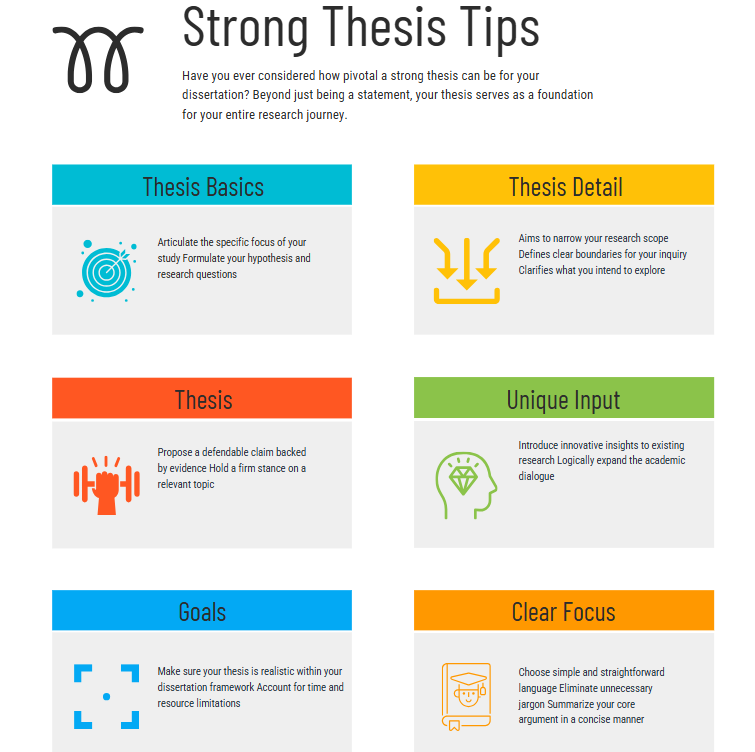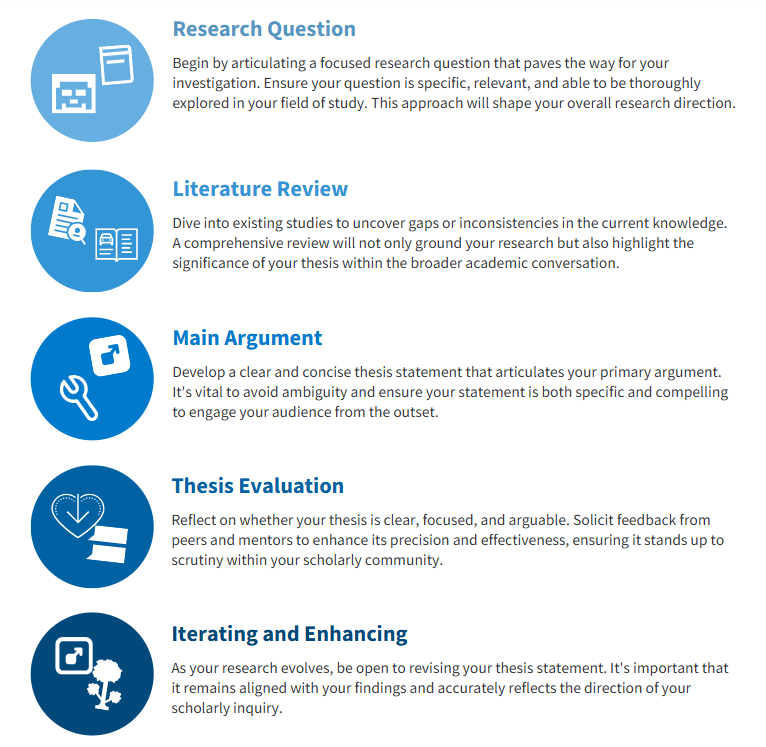The dissertation thesis statement is the cornerstone of your academic journey. It is the single, concise sentence that encapsulates the central argument of your entire dissertation. A strong dissertation thesis statement is not merely a statement of fact; it is a bold assertion, a claim that you will support and defend throughout your research. Crafting this crucial element requires a deep understanding of your topic, a clear articulation of your unique perspective, and a commitment to rigorous academic inquiry.
Understanding the Role of the Dissertation Thesis Statement
The dissertation thesis statement serves multiple purposes:
- Focus: It provides a clear and concise focus for your entire research project. It guides your research, keeps you on track, and ensures that every chapter contributes to the overall argument.
- Road Map: It acts as a road map for your readers, providing a clear understanding of the argument you will present and the key points you will explore.
- Claim: It is a claim that you will argue and support through evidence and analysis. Your dissertation is essentially a detailed defense of this claim.
- Original Contribution: A strong thesis statement reflects an original contribution to knowledge. It offers a fresh perspective or a new interpretation of existing knowledge.
Steps to Crafting a Powerful Dissertation Thesis Statement
Formulating a strong dissertation thesis statement is an iterative process that involves several steps:
- Choose a Topic: Start by choosing a topic that genuinely interests you. This will make the research process more engaging and enjoyable.
- Conduct Preliminary Research: Before you begin formulating your thesis statement, spend time reading widely on your topic. This will help you develop a deep understanding of the existing literature and identify potential gaps or areas for further exploration.
- Develop a Research Question: As you delve deeper into your topic, you will start to formulate a specific research question. This question should be narrow enough to be manageable but broad enough to support a lengthy dissertation.
- Formulate a Tentative Thesis Statement: Based on your research and research question, you can start to formulate a tentative thesis statement. This initial statement may evolve as you continue your research.
- Refine and Refine: This is the crucial step! Don't be afraid to revise and refine your thesis statement as your research progresses. Your understanding of the topic may deepen, and your perspective may evolve.
- Get Feedback: Share your thesis statement with your advisor, colleagues, and fellow researchers. Their feedback can help you identify weaknesses, refine your argument, and ensure clarity and coherence.
- Finalize Your Dissertation Thesis Statement: Once you have thoroughly revised and refined your thesis statement, you can finalize it. This statement will serve as the foundation for your entire dissertation.
Characteristics of a Strong Dissertation Thesis Statement
A strong dissertation thesis statement has several key characteristics:
- Specificity: It is clear and focused, avoiding vague or general statements.
- Argumentative: It presents a claim that can be supported by evidence and analysis.
- Original: It offers a fresh perspective or new interpretation of existing knowledge.
- Feasible: It is a claim that can be supported within the scope of your dissertation.
- Clear and Concise: It is written in clear and concise language, avoiding jargon or overly complex terminology.

Examples of Strong Dissertation Thesis Statements
Here are some examples of strong dissertation thesis statements:
- "Despite its technological advancements, the contemporary American healthcare system continues to prioritize profit over patient care, resulting in a system that is both ineffective and inequitable."
- "The rise of social media platforms has significantly impacted the way we consume news, leading to a decline in trust in traditional media institutions and the spread of misinformation."
- "The implementation of neoliberal economic policies in Latin America has resulted in increased economic inequality and social instability, undermining the region's democratic institutions."
Avoiding the Common Mistakes in Dissertation Thesis Statements
The dissertation thesis statement is the backbone of your entire research project. It's a single, concise sentence that encapsulates the core argument you'll be defending throughout your dissertation. A strong thesis statement sets the stage for a focused, insightful, and impactful piece of research. However, crafting a compelling and effective thesis statement can be a challenging task, prone to common pitfalls. This section explores five common mistakes in dissertation thesis statements and provides practical advice on how to avoid them.
1. Lack of Focus and Specificity:
One of the most frequent errors is a dissertation thesis statement that's too broad or vague. A thesis statement should not simply state a general topic or area of interest. It should clearly articulate the specific argument you'll be advancing. Instead of saying, "This dissertation explores the impact of social media on political discourse," you could say, "This dissertation examines the ways in which social media platforms amplify partisan polarization within American political discourse, contributing to a decline in civil discourse and factual debate." The second statement is much more specific and outlines a clear argument that will be explored throughout the dissertation.
2. Unclear Claim:
A thesis statement should not be a neutral observation or a statement of fact. It needs to make a clear claim that can be argued and supported with evidence. Avoid stating your dissertation thesis statement as a question or a hypothesis. For example, "This dissertation explores the question of whether social media impacts political discourse" is not an effective dissertation thesis statement. Instead, you should present a clear claim, such as "This dissertation argues that social media significantly impacts political discourse by creating echo chambers and reinforcing pre-existing biases."
3. Lack of Direction and Structure:
The dissertation thesis statement serves as a compass for your entire dissertation. It should guide the structure and organization of your research. A strong dissertation thesis statement will inherently suggest the main arguments, sections, and chapters that will follow. If your dissertation thesis statement does not logically point towards the structure of your research, it may be too broad or unclear. Consider how your dissertation thesis statement can serve as a roadmap for your research journey.
4. Overly Assertive or Dogmatic Tone:
While you should be confident in your argument, avoid an overly assertive or dogmatic tone in your thesis statement. It's important to acknowledge the complexity of your topic and the possibility of alternative perspectives. Avoid absolute statements, such as "This dissertation proves" or "This dissertation definitively demonstrates." Instead, use qualifiers such as "This dissertation suggests," "This dissertation argues," or "This dissertation examines." This allows you to present a nuanced and compelling argument while acknowledging the limitations of your research.
5. Ignoring the Specifics of Your Field:
Your thesis statement should be relevant and insightful within the context of your specific academic field. Consult relevant literature and engage with established theories and concepts to ensure that your thesis statement makes a unique contribution to the existing scholarship.
To avoid these mistakes and craft a compelling dissertation thesis statement, consider the following steps:
- Start with a clear research question: Before formulating your dissertation thesis statement, ask yourself a specific, focused research question that drives your research.
- Explore the literature: Consult existing scholarship in your field to identify gaps, controversies, and potential areas of exploration.
- Craft a concise and specific argument: Clearly articulate the unique claim you'll be making in your dissertation.
- Test your thesis statement: Ask yourself whether your dissertation thesis statement is clear, specific, focused, and arguable. Share your dissertation thesis statement with your advisor and colleagues for feedback.
- Refine and revise: Be willing to revise your dissertation thesis statement as your research evolves and your understanding deepens.

Crafting a strong dissertation thesis statement is an essential step in conducting successful research. By avoiding these common mistakes and following these tips, you can set the foundation for a compelling, impactful, and insightful dissertation that makes a meaningful contribution to your field. Remember, your thesis statement is the foundation upon which your entire dissertation will be built, so invest the time and effort needed to ensure it is clear, focused, and argumentative.
The Power of a Strong Dissertation Thesis Statement
A strong dissertation thesis statement is the foundation of your academic journey. It provides direction, focus, and clarity for your research. It is a statement of your intellectual commitment, your unique perspective, and your ability to contribute to the existing body of knowledge. As you embark on the challenging but rewarding task of writing your dissertation, remember that your dissertation thesis statement is your guiding star, leading you towards a successful completion of your academic journey.
Formulating a strong dissertation thesis statement is a crucial step in the dissertation writing process. It requires careful planning, thorough research, and a willingness to refine and revise your ideas. By following the steps outlined in this article and avoiding common mistakes, you can craft a powerful and impactful statement that will guide your dissertation research and serve as the cornerstone of your academic success.
Remember, your thesis statement is not just a sentence; it is a declaration of your intellectual ambition, a commitment to rigorous scholarship, and a testament to your dedication to the pursuit of knowledge. Take the time to carefully craft your statement, and it will serve as a strong foundation for a successful and impactful dissertation.
Get Professional Dissertation Writing Assistance
At Exemplary Dissertations, we can help you to craft all the sections of your dissertation. Our skilled writers are available round the clock to deliver customized help in crafting authentic and impactful dissertations. Apart from writing your dissertations, we also do proofreading, editing, formatting and plagiarism removal. Besides, we can also assist you with writing essays, research papers and case studies.